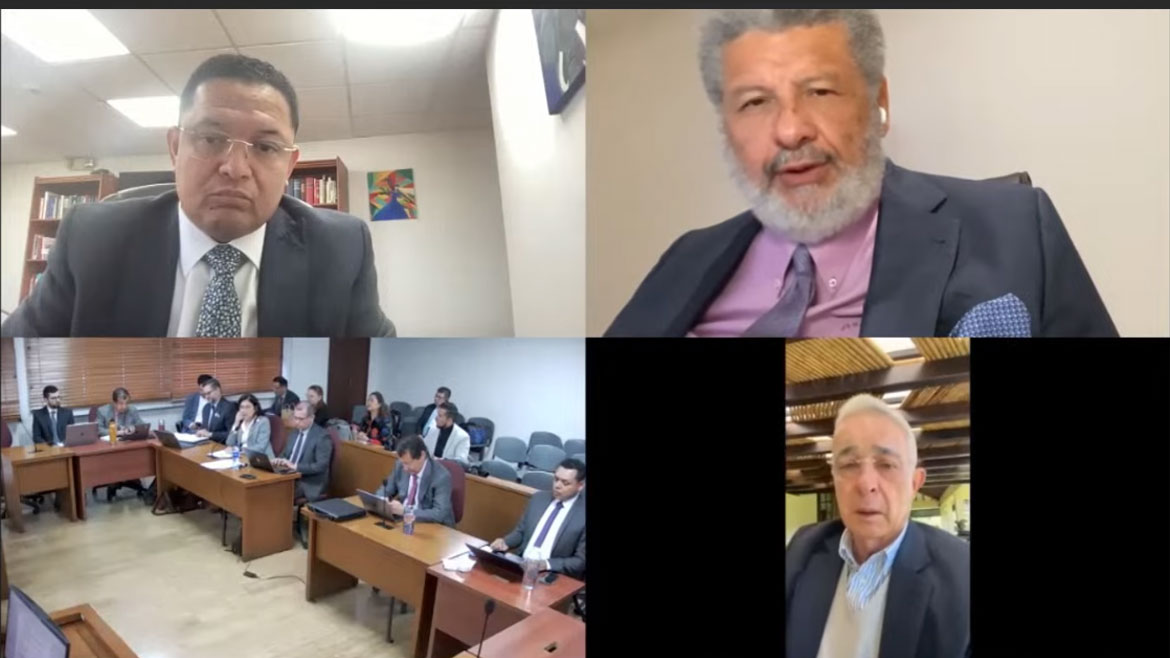Colombia’s prosecution exposed former President Alvaro Uribe’s alleged “strategy to manipulate the course of criminal justice” to obscure his family’s alleged links to paramilitary organization AUC.
According to the prosecution, Uribe has been trying to intimidate witnesses since at least February of 2012 when the former president pressed criminal charges against Senator Ivan Cepeda.
Uribe told the Supreme Court at the time that Cepeda had tried to bribe former members of the AUC to falsely claim that the former president and his brother, Santiago, were involved in the creation of the Bloque Metro paramilitary group in 1996.
After a six-year investigation, the Supreme Court absolved Cepeda and opened a criminal investigation into Uribe for allegedly bringing witnesses and intimidating the family of one of these former paramilitaries, Juan Guillermo Monsalve.
Within months, this new investigation revealed evidence suggesting that Uribe and dozens of his associates had stepped up their intimidation practices and were also targeting former Prosecutor General Eduardo Montealegre, who had ordered prosecutors to investigate the Uribe brothers’ alleged involvement in the creation of the Bloque Metro and another paramilitary group, the 12 Apostles.
In his closing statement, Prosecutor Marlenne Orjuela said that this investigation revealed six alleged conspiracies to smear Cepeda and Montealegre, force the retraction of Monsalve and discredit the testimony of the second former Bloque Metro member, Pablo Hernan Sierra.
Evidence provided by the prosecution suggested that Uribe led all of these conspiracies and gave his fixer, Diego Cadena, a real estate property with which the self-proclaimed “gangstattorney” could bribe those demanding money.
1. Attempt to bribe Monsalve 1
Wiretaps and video footage would prove that Uribe authorized Cadena to bribe Monsalve with the help of his cellmate Enrique Pardo, a jailed kidnapper whose family has contact with Uribe’s defense team and his far-right political party, the Democratic Center.
2. Attempt to bribe Monsalve 2
Wiretaps would demonstrate that the president of the National Electoral Council, Alvaro Hernan Prada, employed an acquaintance of Monsalve, alleged gangster “Caliche,” to convince the former Bloque Metro member to “take the side of Uribe”
3. Attempt to smear Cepeda
Wiretaps and interviews would prove that Uribe instructed extradited drug trafficker “El Tuso” to write letter in which he falsely claimed that Cepeda offered him benefits if he testified against Uribe and his family. El Tuso is a close friend of Uribe’s cousin Mario, who spent years in prison for his ties to the AUC. Others implicated in this alleged conspiracy are the brother of extradited paramilitary boss “Rogelio” and former Interior Minister Fabio Valencia.
4. Attempt to smear Montealegre
Wiretaps and testimonies would prove that Cadena promised benefits to jailed former prosecutor Hilda Ni??o after she accused Montealegre of conspiring against the Uribe family.
5. Attempt to smear Cepeda and Sierra
With the help of a jailed boss of the Medellin mafia, “Cesarin,” Cadena obtained three unsubstantiated witness statements that sought to smear Cepeda’s work in prisons and the credibility of Pablo Hernan Sierra’s testimonies about Uribe. These witness statements were written by Cadena and Cesarin’s lawyer, Angela Lopez.
6. Attempt to smear Cepeda and Sierra 2
The third alleged attempt to smear Cepeda and Sierra was discovered after failed negotiations between Cadena and former AUC commander Carlos Enrique Velez, a.k.a. “Victor,” who expected a COP200 million ($49 thousand) payment for false testimonies from other former paramilitaries who accused Cepeda and Sierra of conspiring against Uribe. Victor ended up testifying against Uribe and providing evidence of payments he did receive.
Before ruling on Uribe’s alleged fraud and bribery practices to obstruct investigations into his family’s alleged ties to the AUC, Judge Sandra Herrera will hear his alleged victims, his alleged defense attorney and the former president himself.
The ruling, which will likely be appealed, is expected within a month.









